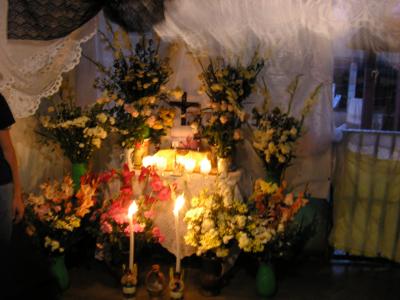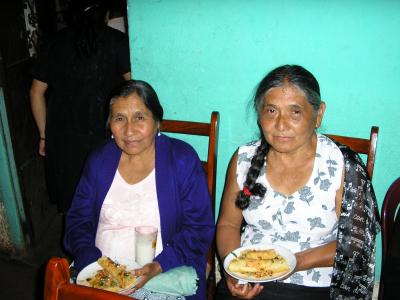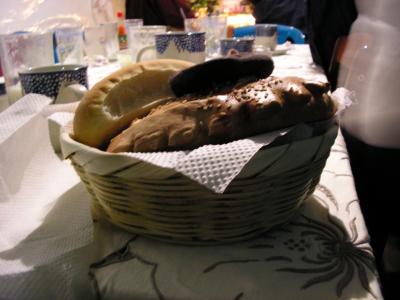In honor of "Don Jorge"
There are different kinds of post-death rituals. I image they change from country to country, culture to culture, time to time... the death of my beloved Coki forced me to experience two different kinds of rituals, both following the "novena" that consists on a series of different prayers and chants followed after special occasions and for specific reasons: Christmas, the death of a loved one, a holiday, etc.
The "novena" (the one prayed after the death of a loved one) goes from the next day of the death to the 9th day after. Family, friends and the "rezadoras" (women that lead the prayers and chants) gather usually in the late afternoon, around 6 or 7.
It's done in private houses. A small altar is arranged: lots of flowers, incense (I love the smell!), candles, pictures, etc. One thing that called to my attention was a glass of water in the middle of the altar. I asked one of the "rezadoras" what it was for and she told me it's for the purification of the soul of the deceased.
After following special prayers comes the Rosary. Everything between chants of deep sorrow and a very special atmosphere. It's very intense.
After the "novena" is done, there's lots of food prepared. Usually there's delicious tamales,"tostadas", "enchiladas", "champurradas" and so. To drink, hot chocolate and coffee. Mmmmmh, right? It amazed me how food helped calm everyone. After crying and moaning, everybody seemed very happy and relaxed, while eating. The "rezadoras" get a basket with bread, pastries and a piece of chocolate for their help.
The ninth day is the hardest: it's the definite good-bye. The "novena" is followed as in the other 8 days, but the chants are more melancholic, full of grief and sorrow. It's done at the same time as the other 8 days, but it's repeated at midnight. That's the last one, the one that actually releases and hands the loved one's soul to God. The acceptation.
We (my family and I) had been doing the "novena" through mass. Everyday, at 6.30 and of course, dinner at my grandmother's after. My Nana, who's worked at my grandparents' for over 30 years, and her family, had been following a different "novena" in their village outside the city. We were invited on the 8th day and this are some of the pictures I took:

The altar

"Rezadoras"
My Nana and her sisters

The "rezadora"'s bascket
The "novena" (the one prayed after the death of a loved one) goes from the next day of the death to the 9th day after. Family, friends and the "rezadoras" (women that lead the prayers and chants) gather usually in the late afternoon, around 6 or 7.
It's done in private houses. A small altar is arranged: lots of flowers, incense (I love the smell!), candles, pictures, etc. One thing that called to my attention was a glass of water in the middle of the altar. I asked one of the "rezadoras" what it was for and she told me it's for the purification of the soul of the deceased.
After following special prayers comes the Rosary. Everything between chants of deep sorrow and a very special atmosphere. It's very intense.
After the "novena" is done, there's lots of food prepared. Usually there's delicious tamales,"tostadas", "enchiladas", "champurradas" and so. To drink, hot chocolate and coffee. Mmmmmh, right? It amazed me how food helped calm everyone. After crying and moaning, everybody seemed very happy and relaxed, while eating. The "rezadoras" get a basket with bread, pastries and a piece of chocolate for their help.
The ninth day is the hardest: it's the definite good-bye. The "novena" is followed as in the other 8 days, but the chants are more melancholic, full of grief and sorrow. It's done at the same time as the other 8 days, but it's repeated at midnight. That's the last one, the one that actually releases and hands the loved one's soul to God. The acceptation.
We (my family and I) had been doing the "novena" through mass. Everyday, at 6.30 and of course, dinner at my grandmother's after. My Nana, who's worked at my grandparents' for over 30 years, and her family, had been following a different "novena" in their village outside the city. We were invited on the 8th day and this are some of the pictures I took:

The altar

"Rezadoras"
My Nana and her sisters

The "rezadora"'s bascket
rocio - 21. Aug, 14:33

